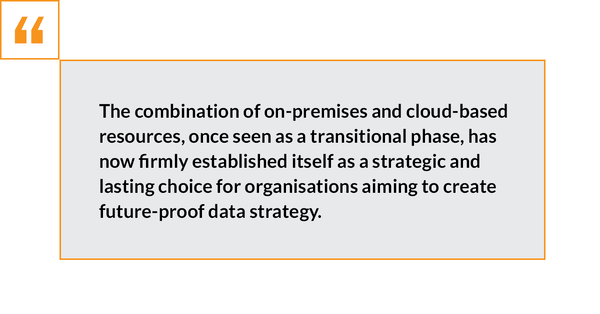Aligning data solutions with business goals for a successful digital transformation
Sponsored by Tiger TechnologyWhen building their storage infrastructure, organisations need to find the perfect synergy between the right workload, the appropriate data and their industry-specific requirements.

Whether a business is operating in healthcare, surveillance, finance, manufacturing, IT or any other industry, its ability to manage and analyse data has become pivotal in achieving organisational success and remaining competitive in the digital transformation era.
However, not all data is created equal or serves the same purposes. Aligning the right data management strategy with the right business goals is therefore crucial for a successful digital transformation. But how can this be achieved?
This article explores the evolving needs of different industries in the use of data management, storage and artificial intelligence (AI), and discusses how businesses can tailor their data strategies to meet industry-specific requirements. Additionally, we’ll delve into the strategic use of hybrid cloud as a powerful enabler of digital transformation for some industries.
Shifting skies: data’s journey to the cloud
A study by IDC predicts that by 2025, the total volume of data stored globally will reach 175 Zettabytes. To provide some perspective, if that volume of data were stored on DVD media, the result would be a towering stack of discs 4.6 million kilometres high – 12 times the distance from the Earth to the moon. IDC’s study also shows that a significant 80 per cent of this data volume is anticipated to be generated by enterprises.
This statistic underscores the exponential growth of data within the business landscape and highlights the immense challenges that organisations will (and already do) face in effectively managing and leveraging this wealth of information.
One of the main reasons for seeking alternative storage solutions is the sheer impracticality of accommodating such vast data within on-premises infrastructure. First of all, traditional servers have limited storage capacity, which means that continuously expanding them to meet growing data requirements becomes increasingly expensive and complex. Moreover, the physical space required to house the necessary hardware becomes a logistical challenge as data continues to surge.
The speed and efficiency of data access and processing also become critical factors in harnessing the value of this massive dataset. According to a survey conducted by Accenture, 79 per cent of businesses agree that companies that don’t embrace big data may lose their competitive advantage and might even go extinct. On-premises warehouses, though, may struggle to deliver the rapid data processing capabilities required for tasks such as real-time analytics, machine learning and AI-driven insights.
This is where cloud storage solutions come into play. Cloud providers offer virtually unlimited scalability, allowing organisations to expand their storage capacity seamlessly. The flexibility of cloud storage also means businesses can adapt to changing data needs, including unexpected demand spikes, without the substantial upfront investments associated with expanding on-premises footprint.
Moreover, cloud storage solutions are designed to provide high availability and redundancy, ensuring data is accessible and secure even in the face of unexpected events or disasters. This level of reliability is crucial for mission-critical operations, which are increasingly reliant on uninterrupted access to vast data stores.
Aligning data strategies with industry-specific requirements
However, managing data in the cloud can be a big challenge for businesses, as they must navigate various options, including cloud-first, multi-cloud or hybrid cloud strategies where there is no one-size-fits-all solution.
Deciding which of these strategies to pursue hinges on the specific demands and obstacles in each industry, each organisation even. Each strategy also carries its own set of benefits and drawbacks, compelling businesses to conduct a thorough assessment of their requirements, regulatory obligations and data security considerations to determine which approach aligns best with their needs.
For instance, certain industries, such as technology start-ups and agile e-commerce enterprises, gravitate towards a cloud-first approach, due to their emphasis on scalability and adaptability. Moreover, cloud services empower retailers to swiftly deploy and update online stores, inventory management systems and customer relationship management tools. Such an approach facilitates rapid innovation and enables quick adjustments to shifting market dynamics.
The cloud-first strategy, though, may not be such a good fit for the financial sector. Among the financial services leaders who took part in a 2020 McKinsey survey, only 13 per cent had half or more of their IT footprint in the cloud. This observation is corroborated by various studies, all underscoring security as a paramount concern for IT and C-suite decision-makers entrusted with safeguarding customer data and IT systems. The regulatory environment in the financial sector brings an added layer of complexity to new technology initiatives.
Hence, either a multi-cloud or hybrid cloud approach proves more suitable for their requirements. Multi-cloud enables financial organisations to select best-in-class services from various providers, while hybrid cloud segregates sensitive and non-sensitive data, ensuring regulatory compliance. A similar preference for the hybrid cloud approach can be observed in sectors such as energy, healthcare and government institutions, where even the multi-cloud scenario is viewed with caution due to the unique challenges and security considerations inherent in these industries.
Leveraging hybrid cloud for mission-critical success
In fact, Cisco’s 2022 Global Hybrid Cloud Trends Report found that 82 per cent of survey respondents have already adopted hybrid cloud, proving that the combination of on-premises and cloud-based resources, once seen as a transitional phase, has now firmly established itself as a strategic and lasting choice for organisations aiming to create future-proof data strategy. It is also the approach Tiger Technology believes in and focuses its file data services on.

On one hand, hybrid cloud allows enterprises to leverage their existing data centre architecture without losing billions’ worth of hardware. All while reaping the advantages of the cloud including unlimited capacity expansion, remote collaboration, integration of AI tools and so on.
On the other hand, certain workloads simply do not align well with the cloud due to their poor compatibility with microservices architectures and the potential for increased latency arising from network, storage and inter-service communications. In such cases, adopting an on-premises-first approach to the hybrid cloud and maintaining the status quo for specific applications might be the most reasonable and secure course of action.
Conclusion
Recognising the evolving needs of diverse industries regarding data management, storage and AI use is the lynchpin of remaining competitive. By tailoring data strategies to meet industry-specific requirements and harnessing the capabilities of hybrid cloud solutions, businesses can position themselves for success in the digital age. Embracing the power of data-driven decision-making and adapting to industry trends will be the key to thriving in the ever-evolving landscape of the data-centric economy.
Learn how Tiger Technology, a hybrid-centric file data services provider, is helping customers to adopt a data strategy that revolves around their demands, not the other way around.

Business Reporter Team
You may also like
Most Viewed
Winston House, 3rd Floor, Units 306-309, 2-4 Dollis Park, London, N3 1HF
23-29 Hendon Lane, London, N3 1RT
020 8349 4363
© 2025, Lyonsdown Limited. Business Reporter® is a registered trademark of Lyonsdown Ltd. VAT registration number: 830519543





